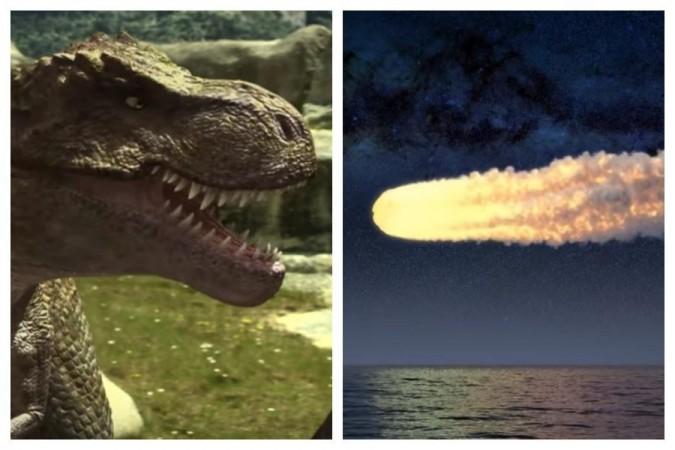
Scientists believe that a giant asteroid hit the earth around 66 million years ago, and resulted in the extinction of dinosaurs, then dominant species on the blue planet. However, critics who oppose this hypothesis claim that the extinction of dinosaurs was triggered following the explosion of a giant volcano. As the debate surrounding the real reason that caused the extinction of dinosaurs continues, a new study conducted by UK researchers has affirmed that asteroids could be the culprit that killed these giant beasts that once roamed across the earth.
The debate surrounding asteroid hit and volcanic eruption
The new report surprisingly puts forward a new hypothesis and researchers who took part in the study claim that asteroids wiped off dinosaurs from the earth, and a giant volcanic eruption actually helped life to recover from the deep space impact.
The asteroid impact unleashed a 100 million megaton blast on the earth, and it caused an immediate shockwave that could have been catastrophic for anything in the region. The study report also revealed that several species of animals died off instantly even a thousand kilometers away from the impact.
Soon after the asteroid hit, giant plumes of dust were pushed to the atmosphere where it lasted for more than a decade. As the sun's rays did not reach the surface of the earth, the planet witnessed conditions very similar to a nuclear winter. Due to this phenomenon, 75 percent of life was wiped off from the surface of the earth.
The new study report titled, 'Asteroid impact, not volcanism, caused the end-Cretaceous dinosaur extinction' reveals that pronounced volcanic activity was there during the time of dinosaur extinction. The Deccan Traps in India, widely considered as one of the volcanic features in the globe started eruptions during this particular period.
"We show that the asteroid caused an impact winter for decades and that these environmental effects decimated suitable environments for dinosaurs. In contrast, the effects of the intense volcanic eruptions were not strong enough to substantially disrupt global ecosystems. Our study confirms, for the first time quantitatively that the only plausible explanation for the extinction is the impact winter that eradicated dinosaur habitats worldwide," said Alessandro Chiarenza, from the Department of Earth Science and Engineering at Imperial College, London, and the lead author of the study, in a recent statement.
Did the absence of sex result in the extinction of dinosaurs?
A few months back, Professor Brian J Ford, a popular biologist who authored the book 'Too Big to Walk: The New Science of Dinosaurs' had suggested that it is the absence of sex that resulted in the extinction of dinosaurs.
According to Ford, dinosaurs had used sex lakes for mating due to their gigantic body size, as the buoyancy of waters helped them to support their bulk. As a result of continental drift, these lakes disappeared, and thus dinosaurs were unable to mate effectively which ultimately resulted in their extinction.














